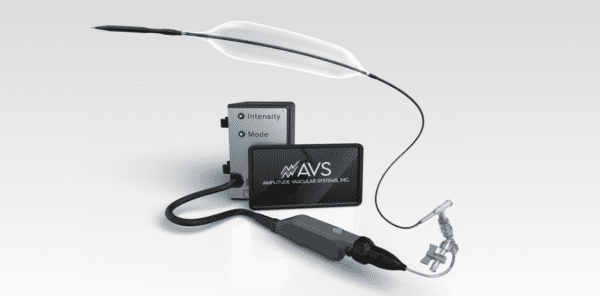|
AVS Series B | Wearable Cardiac Ultrasound
January 30, 2023
|
|
|

|
|
Together with
|

|
|
|
“This capability is unprecedented in conventional clinical practice and the non-invasiveness can extend potential benefits to the outpatient and athletic populations.”
|
|
UCSD’s Sheng Xu Group on their wearable cardiac ultrasound’s potential impact.
|
|
|
Surgeries & Interventions
|
|
|
|

|
|
Medical device startup AVS recently closed $20M in Series B funding to advance novel treatments for severely calcified arterial disease.
AVS is at the forefront of pulsatile intravascular lithotripsy (PIVL) technology, which releases sonic pressure waves in frequent bursts to gently shatter calcium and open arteries.
- Although still under development, AVS’s therapy is delivered through a balloon-based platform called the Pulse IVL System, and is the only minimally invasive technology to treat calcified arterial disease with a single device.
- Vascular calcification not only increases the risk of major cardiovascular events, but it can also lead to limb amputations – presenting a huge opportunity for minimally invasive solutions that can address the problem.
The fresh funding will accelerate AVS’s clinical trial timelines for FDA approval, now expected sometime in 2024. The Series B will also advance the development and preclinical work on a PIVL device for coronary cases.
- In September 2022, AVS announced enrollment, successful treatment, and positive 30-day follow-up data of the first patients in its POWER PAD I clinical trial, its first-in-human study.
- Early trial results showed that PIVL can successfully treat patients with multiple lesions using a single device, leading to a reduction in leg pain, an increase in blood flow to the leg, and improved ability to walk. No major adverse events were reported.
The Takeaway
AVS is now one step closer to offering a minimally invasive treatment for patients with severely calcified peripheral arterial disease, paving the way for it to begin reducing the number of vascular surgeries needed to treat severe cases. If AVS can successfully prove the efficacy of its Pulse IVL system, physicians will likely welcome another tool in their intravascular lithotripsy toolbox.
|




|
|
Automating Echo AI
Check out this Imaging Wire Show featuring Us2.ai’s co-founders, James Hare and Carolyn Lam MBBS, PhD, detailing Us2.ai’s unique origins, impressive capabilities, and big goals to automate echocardiography reporting across the world.
|
|
The Benefits of Outsourced Post-Processing
Using an outsourced cardiac image post-processing solution doesn’t have to mean sacrificing control of the results. Discover how PIA’s customizable post-processing workflow can help you get the most out of your images.
|
|
- Wearable Cardiac Ultrasound: UCSD researchers developed a wearable cardiac ultrasound device that obtains continuous and real-time cardiac function data. The researchers designed the wearable ultrasound to enhance mechanical coupling with patients’ skin, allowing the left ventricle to be examined from different views while the patient is moving. They also developed a deep learning model that extracts LV volume from the ultrasound recordings, producing waveforms of key cardiac performance indices such as stroke volume, cardiac output, and ejection fraction.
- TAVI and SAVR Risks: A European Heart Journal meta-analysis of eight randomized trials (8.7k patients, 46.5mo avg follow-up) shed new light on TAVI and SAVR outcomes. Among lower-risk patients, TAVI reduced mortality and death/disabling stroke rates within the first year (relative risks: 0.67 & 0.68), but the two valve procedures had comparable results over longer follow-up periods. Meanwhile, high-risk TAVI and SAVR patients showed no significant outcome differences.
- CardioRenal’s Breakthrough Designation: CardioRenal’s RenalGuard Therapy device received FDA Breakthrough Device designation for prevention of cardiac surgery-associated acute kidney injury (AKI), fast-tracking RenalGuard’s review and clinical trial processes. RenalGuard prevents AKI by balancing patients’ hydration with real-time urine output monitoring and an IV infusion.
- Higher Volume, Better Outcomes: Although not explicitly a cardiology study, Clarify Health Institute’s latest research revealed that high-volume surgeons deliver better patient outcomes (high-volume was over 100 surgeries between 2017 and 2020, low-volume was less than 10 surgeries). Among 178k orthopedic procedures from 23.5k providers (14% of all hip and knee replacements in the US), high-volume surgeons saw fewer post-acute inpatient readmissions at 7 and 60 days (37-51% lower than low-volume surgeons), as well as lower costs ($2.8k, $1.5k).
- Keya’s FFR-CT Clearance: Chinese imaging AI company Keya Medical announced the FDA clearance of its DeepVessel FFR solution, marking a rare addition to the U.S. FFR-CT segment. DeepVessel FFR analyzes CCTA exams to non-invasively assess coronary artery physiological function, and then generates a 3D model of the coronary artery tree and FFR-CT value estimates. Keya Medical might not be well known in the U.S., but it’s generated at least $110M in funding and is already approved for use in the EU and China.
- CMRI AI’s PTT Potential: A new European Heart Journal study demonstrated that pulmonary transit time (PTT) – the time blood takes to pass from the right ventricle to the left ventricle – can be “easily, even automatically” obtained from stress perfusion cardiac MRIs using artificial intelligence. The team applied a PTT AI model to 353 patients’ routine stress perfusion CMRIs, automatically/accurately obtaining 266 patients’ PTTs, and showing that AI-based hemodynamic quantification might support future dyspnea and heart failure evaluations.
- Ro Body Program: Ro unveiled a new weight loss program dubbed the Ro Body Program, which combines increasingly popular GLP-1 medications with at-home diagnostics and one-on-one coaching from nurses. The Ro Body Program expands Ro’s services beyond its current portfolio (Mental Health, Skin Care, Fertility, Male Health) with comprehensive obesity care that uses at-home metabolic testing to help develop personalized treatment plans that can be tailored to individual weight loss goals.
- Americans Putting Off Medical Care: A recent Gallup poll showed that 38% of Americans delayed medical treatment due to costs during the last year, which was the most in 22 years and a big jump from 2021 (26% delayed care). The survey revealed higher incidences of delayed care among individuals who earn less than $40k compared to $100k or more (34% vs. 18%), women compared to men (32% vs. 20%), and ages 18-49 compared to ages 50-64 (35% vs. 25%).
- 1health + Inspire Diagnostics: At-home testing startup 1health.io is partnering with Inspire Diagnostics to bring health and wellness tests (inflammation, sleep, stress, thyroid, heart health) directly to consumers. 1health is providing the complete end-to-end platform for the new Inspire Wellness@Home testing product, allowing Inspire Diagnostics to streamline ordering and focus on customer service. The at-home Heart Health test uses a finger-prick blood sample to test for multiple heart-related markers including cholesterol and blood triglycerides.
- Ransomware Attacks Double: Ransomware attacks on US healthcare delivery organizations more than doubled from 2016 to 2021, climbing from 43 to 91 breaches per year. A University of Minnesota-led study identified 374 attacks in total, exposing the personal health information of 42M patients – over 10% of the US population. Although only 15.8% of breaches resulted in health information making its way to the dark web, the authors “strongly suspect underreporting for basically everything.”
|
|
Revolutionizing Heart Attack Prevention
Cleerly founder and CEO Dr. James Min talks with preventive cardiologist Dr. Erica Jones about Cleerly’s groundbreaking new pathway for heart attack prevention. Watch their conversation to learn about Cleerly’s impact on cardiac health outcomes.
|
|
Protecting Your Cardiovascular Imaging Data
Are you sure about your cardiovascular imaging data security? Tune-in to this Change Healthcare webinar discussing how hospital systems and healthcare providers can strategically improve their data security.
|
|
ACC/AHA Chest Pain Guidelines Highlight FFRct
Coronary CTA + FFRct is now a front-line pathway in the ACC/AHA’s 2021 Chest Pain Guidelines. Check out the clinical data supporting FFRct’s positioning as a “dominant strategy” and how HeartFlowFFRct Analysis impacts patients, physicians, and administrators.
|
|
|
|
|